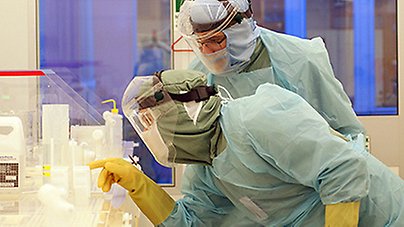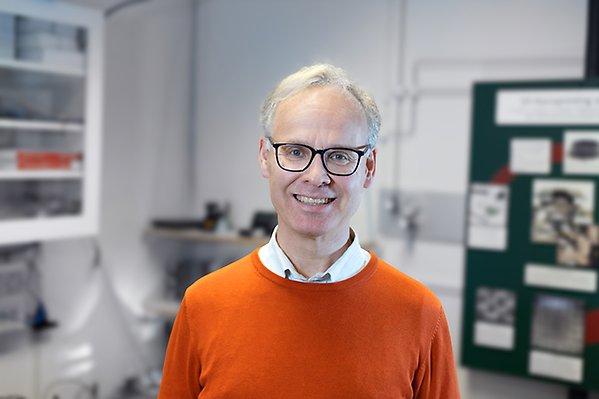Microsystems Technology
%20mikrosystem%20forskning.jpg)
The Division of Microsystem Technology ( MST) is part of the Department of Materials Science and Engineering.
We research and teach about miniaturized components and systems. The subject is an interdisciplinary extension of microelectronics and spans areas such as mechanics, optics, electromagnetism and flow mechanics.
The division's research groups work from a materials science and needs-oriented perspective to develop small sensors, motors, valves, pumps, reactors and analysis systems.
We actively collaborate with a wide range of companies and have contributed to the creation of new companies, both small and those that have grown to several hundred employees.
If you are interested in working in the Microsystems Engineering Department, keep an eye out for vacancies at the Department.
More about Microsystems Technology
Microsystems engineering involves the development and study of micro- and millimetre-sized components and systems. The subject has its roots in microelectronics and spans areas such as mechanics, optics, electromagnetism and fluid mechanics.
Microsystems technology enables functions and performance that are hardly achievable with conventional technologies. It can provide solutions to many of society's needs and also contribute to a better life with new opportunities. Components built with microsystems technology can be found in products used in almost all sectors of society. The most common uses are in our cars and in gadgets such as smart phones and watches.
Through the internet, small sensors and actuators (used to control a mechanism or mechanical system) can wirelessly connect people and machines for a transparent, resilient and sustainable society. Less common but very important components are used in machines to make monitors and electronics, but also in DNA analysis and medical diagnostics.
Research areas in Microsystems Technology
Mankind and Society
Microsystems have potential to meet the UN Agenda 2030 goal to achieve a better and more sustainable future for all.

Space and our planet
Strange as it may seem, microtechnology plays a role of increasing importance in the exploration and exploitation of the largest we know: our planet, including its deep seas and what’s far beneath its crust, but also space.

Materials, Manufacturing and Mechanics
The research area has its origins in materials science, with a focus on the mechanical properties of materials and manufacturing methodology for miniaturized systems.

Avdelningens publikationer
- Cantoni, Federico; Barbe, Laurent; Pohlit, Hannah et al., 2024
- Fu, Le; Zhou, Huasi; Klintberg, Lena et al., 2024
- Duoc, Vo Thanh; Nguyen, Hugo; Ngoc, Trinh Minh et al., 2024
- Åkerfeldt, Erika; Thornell, Greger; Persson, Anders, 2024
- Lucchetti, Mara; Werr, Gabriel; Johansson, Sofia et al., 2024
Education
Microsystem technology is a true engineering science with a focus on usability. It allows us to work with many different applications and meet people's needs. There is a huge joy in creating new innovative solutions!
If you have questions about our courses or the programmes where you study them, you are welcome to contact the department's course administrator or the study counsellor for your programme.
Information about programmes at the department can be found in the student entrance.
Courses within microsystem technology
- Micro- and Nanotechnology I, 5 credits (programme course, not given as a stand-alone course)
- Micro- and Nanotechnology II, 5 credits (programme course, not given as a stand-alone course)
- Project Course in Micro- and Nanotechnology, 10 credits (programme course, not given as a stand-alone course)
- Electronics in Extreme Environments, 5 credits (programme course, not given as a stand-alone course)
First cycle technology courses
- Introduction to Materials Engineering, 5 credits (program course, not given as freestanding course)
- Machine Elements, 10 credits (program course, not given as freestanding course)
- Manufacturing Methodologies, 10 credits (program course, not given as freestanding course)
Bli doktorand inom mikrosystemteknik
We offer doctoral education in the subject of engineering physics with a focus on microsystems technology. If you want to become a doctoral student at the division, apply for an advertised doctoral position.
For more information about the subject specialisation, please contact Professor Klas Hjort.
More information on postgraduate education at the department
Degree Projects
We welcome you to contact us if you are interested in doing your degree project with us.
Sometimes we have project proposals to give but there is always something to do. Contact Klas Hjort, Greger Thornell or Lena Klintberg if you are interested.
Contact us
You are welcome to visit us at the Ångström laboratory, Lägerhyddsvägen 1, Uppsala. We are located in house 2, floor 2.
Head of Divison: Professor Klas Hjort, phone: 018-471 3141.

